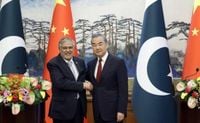On Saturday, May 10, 2025, tensions between India and Pakistan escalated dramatically as the two nations briefly agreed to a ceasefire, only for Pakistan to violate it within hours. This rapid turn of events has drawn significant international attention, particularly from China, which has called for both countries to exercise restraint.
The ceasefire was announced following a phone call between Chinese Foreign Minister Wang Yi and India's National Security Advisor Ajit Doval. During this conversation, Wang urged both nations to "remain calm and exercise restraint" in light of recent hostilities. The Chinese government released a statement emphasizing that peace in the region is "hard-won and should be cherished," while also condemning the recent Pahalgam terror attack that had triggered India's military response earlier in the week.
According to Doval, the Pahalgam attack resulted in the deaths of 26 individuals, including an Army jawan and a senior local official. He reiterated that India had taken necessary counter-terrorism actions but stressed that "war is not India’s choice and does not serve the interests of any party." Both leaders expressed a commitment to maintaining the ceasefire and restoring regional peace.
China's statement highlighted the importance of stability in Asia, noting that "India and Pakistan are neighbouring countries that cannot be relocated" and that the current international situation is complex and volatile. Wang Yi further emphasized that both nations should resolve their differences through dialogue and consultation.
The ceasefire came on the heels of India's Operation Sindoor, a series of precision strikes on terror camps across Pakistan and Pakistan-occupied Kashmir, utilizing advanced military technology including Rafale jets and kamikaze drones. These operations exposed vulnerabilities in Pakistan's air defense systems and led India to suspend the Indus Waters Treaty while severing trade and cultural ties with its neighbor.
However, within hours of the ceasefire announcement, reports emerged of drone sightings and explosions in Jammu and Kashmir, raising alarms about potential violations. Jammu and Kashmir Chief Minister Omar Abdullah took to social media to express skepticism about the ceasefire's validity, questioning, "What the hell just happened to the ceasefire? Explosions heard across Srinagar!!"
India's Foreign Secretary Vikram Misri confirmed that Pakistan had indeed violated the ceasefire agreement and stated that the Indian armed forces had been instructed to respond firmly to any breaches. He emphasized the need for Pakistan to take the situation seriously and act responsibly in addressing these violations.
In a separate phone conversation, Wang Yi also spoke with Pakistan’s Foreign Minister Ishaq Dar, reiterating China's support for Pakistan amid the escalating tensions. Wang praised Pakistan’s restraint and responsible approach during the ongoing crisis, reaffirming that China would continue to stand by its "iron-clad friend" in upholding its sovereignty and territorial integrity.
“China supports and expects India and Pakistan to achieve a comprehensive and lasting ceasefire through consultation,” Wang stated, reflecting Beijing's desire to maintain stability in the region. He also expressed concern over any further escalation, particularly given China’s shared borders with both countries.
As international observers closely monitor the situation, the Indian and Pakistani Directors General of Military Operations (DGMOs) are scheduled to speak on Monday, May 12, which could prove crucial for future diplomatic efforts.
While the ceasefire was initially welcomed, the subsequent violations have left many questioning its effectiveness and the sincerity of both nations' commitments to peace. The situation remains tense, with both sides on high alert and the potential for further conflict looming.
As the world watches, the diplomatic landscape continues to evolve, with various nations expressing their hopes for a resolution to the long-standing rivalry between India and Pakistan. The involvement of China, which has positioned itself as a mediator and supporter of Pakistan, adds another layer of complexity to an already fraught situation.
In conclusion, the fragile ceasefire reached on May 10 has been marred by immediate violations, raising concerns about the future of peace in the region. The international community, particularly China, is advocating for dialogue and restraint, but the path forward remains uncertain as both nations grapple with the aftermath of recent hostilities.





